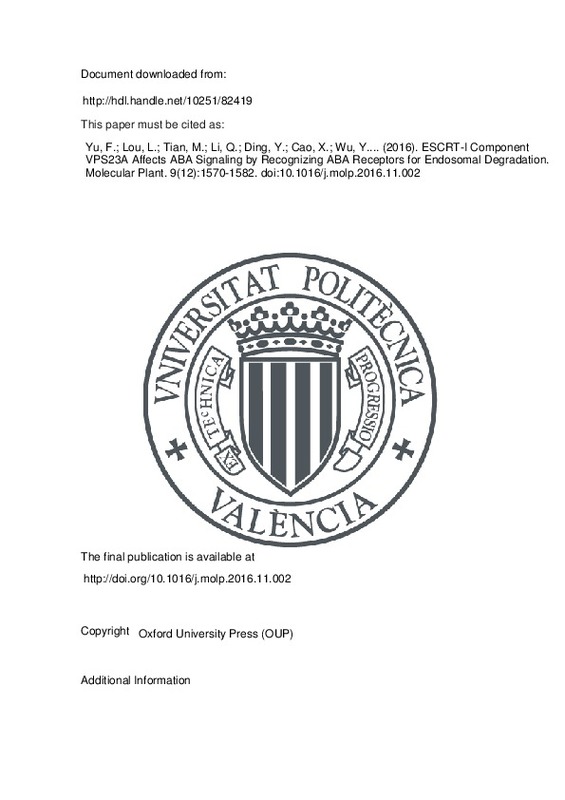JavaScript is disabled for your browser. Some features of this site may not work without it.
Buscar en RiuNet
Listar
Mi cuenta
Estadísticas
Ayuda RiuNet
Admin. UPV
ESCRT-I Component VPS23A Affects ABA Signaling by Recognizing ABA Receptors for Endosomal Degradation
Mostrar el registro sencillo del ítem
Ficheros en el ítem
| dc.contributor.author | Yu, Feifei
|
es_ES |
| dc.contributor.author | Lou, Lijuan
|
es_ES |
| dc.contributor.author | Tian, Miaomiao
|
es_ES |
| dc.contributor.author | Li, Qingliang
|
es_ES |
| dc.contributor.author | Ding, Yanglin
|
es_ES |
| dc.contributor.author | Cao, Xiaoqiang
|
es_ES |
| dc.contributor.author | Wu, Yaorong
|
es_ES |
| dc.contributor.author | Belda Palazón, Borja
|
es_ES |
| dc.contributor.author | Rodríguez Egea, Pedro Luís
|
es_ES |
| dc.contributor.author | Yang, Shuhua
|
es_ES |
| dc.contributor.author | Xie, Qi
|
es_ES |
| dc.date.accessioned | 2017-06-06T11:29:57Z | |
| dc.date.available | 2017-06-06T11:29:57Z | |
| dc.date.issued | 2016-12-05 | |
| dc.identifier.issn | 1674-2052 | |
| dc.identifier.uri | http://hdl.handle.net/10251/82419 | |
| dc.description.abstract | [EN] Recent discovery of PYR/PYL/RCAR-type abscisic acid (ABA) receptors has become one of most significant advances in plant science in the past decade. In mammals, endosomal sorting acts as an important pathway to downregulate different types of receptors, but its role in plant hormone signaling is poorly understood. Here, we report that an ubiquitin E2-like protein, VPS23A, which is a key component of ESCRT-I, negatively regulates ABA signaling. VPS23A has epistatic relationship with PYR/PYL/RCAR-type ABA receptors and disruption of VPS23A enhanced the activity of key kinase OST1 in the ABA signaling pathway under ABA treatment. Moreover, VPS23A interacts with PYR1/PYLs and K63-linked diubiquitin, and PYL4 possesses K63-linked ubiquitinated modification in vivo. Further analysis revealed that VPS23A affects the subcellular localization of PYR1 and the stability of PYL4. Taken together, our results suggest that VPS23A affects PYR1/PYL4 via vacuole-mediated degradation, providing an advanced understanding of both the turnover of ABA receptors and ESCRTs in plant hormone signaling. | es_ES |
| dc.description.sponsorship | This research was supported by grant 2016YFA0500500 from the National Basic Research Program of China and NSFC 31571441 from the National Science Foundation of China. | en_EN |
| dc.language | Inglés | es_ES |
| dc.publisher | Oxford University Press (OUP) | es_ES |
| dc.relation.ispartof | Molecular Plant | es_ES |
| dc.rights | Reserva de todos los derechos | es_ES |
| dc.subject | ABA receptors | es_ES |
| dc.subject | ESCRTs | es_ES |
| dc.subject | Ubiquitin | es_ES |
| dc.subject | Endosomal trafficking | es_ES |
| dc.subject.classification | BIOQUIMICA Y BIOLOGIA MOLECULAR | es_ES |
| dc.title | ESCRT-I Component VPS23A Affects ABA Signaling by Recognizing ABA Receptors for Endosomal Degradation | es_ES |
| dc.type | Artículo | es_ES |
| dc.identifier.doi | 10.1016/j.molp.2016.11.002 | |
| dc.relation.projectID | info:eu-repo/grantAgreement/NKRDPC//2016YFA0500500/ | es_ES |
| dc.relation.projectID | info:eu-repo/grantAgreement/NSFC//31571441/ | es_ES |
| dc.rights.accessRights | Abierto | es_ES |
| dc.contributor.affiliation | Universitat Politècnica de València. Instituto Universitario Mixto de Biología Molecular y Celular de Plantas - Institut Universitari Mixt de Biologia Molecular i Cel·lular de Plantes | es_ES |
| dc.description.bibliographicCitation | Yu, F.; Lou, L.; Tian, M.; Li, Q.; Ding, Y.; Cao, X.; Wu, Y.... (2016). ESCRT-I Component VPS23A Affects ABA Signaling by Recognizing ABA Receptors for Endosomal Degradation. Molecular Plant. 9(12):1570-1582. https://doi.org/10.1016/j.molp.2016.11.002 | es_ES |
| dc.description.accrualMethod | S | es_ES |
| dc.relation.publisherversion | http://doi.org/10.1016/j.molp.2016.11.002 | es_ES |
| dc.description.upvformatpinicio | 1570 | es_ES |
| dc.description.upvformatpfin | 1582 | es_ES |
| dc.type.version | info:eu-repo/semantics/publishedVersion | es_ES |
| dc.description.volume | 9 | es_ES |
| dc.description.issue | 12 | es_ES |
| dc.relation.senia | 332403 | es_ES |
| dc.identifier.eissn | 1752-9867 | |
| dc.contributor.funder | National Key Research and Development Program of China | es_ES |
| dc.contributor.funder | National Natural Science Foundation of China | es_ES |







![[Cerrado]](/themes/UPV/images/candado.png)

